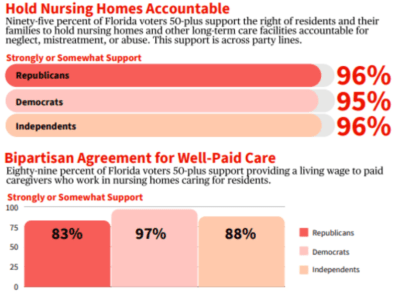 Thanks to COVID-19, this Session of the Florida Legislature looks and sounds different.
Thanks to COVID-19, this Session of the Florida Legislature looks and sounds different.
With social distancing, online testimony, and streaming committee meetings, the Florida Capitol seems quiet, compared to past sessions.
And, as is true in so many horror movies, the quiet is foreboding.
Just as nursing home residents were victimized by the invisible coronavirus during the lockdown of the last year, so they are being victimized by the heavy-hitting industry lobbyists for nursing homes and health care executives in the locked-down Capitol.
Not only have lawmakers fast-tracked bills that give nursing homes immunity from COVID-19-related lawsuits (SB 72), now they’re fast-tracking cuts to the quality of care in Florida nursing homes. Letting these facilities off the hook by making it nearly impossible for residents and families to seek resolution through the court system is shameful.
Piling on proposals that cut the quality of care for nursing home residents is unthinkable — proof that the industry’s self-serving, aggressive push for less accountability and more profit is being fulfilled at the expense of resident safety.
Currently, nursing home residents receive most of their care from Certified Nursing Assistants (CNAs), who are required to have 120 hours of training before being certified. Two bills in the Florida Legislature by Northeast Florida legislators (SB 1132/HB 485), would allow nursing homes to substitute Personal Care Attendants (PCAs), who only receive 16 hours of classroom training and no mandatory directly supervised clinical experience, for CNA care.
While industry lobbyists have sold legislators the line that this is an apprenticeship program, they have made it clear that their real intent is to substitute lower-cost, lesser-trained PCAs for more qualified caregivers.
AARP continues to believe that PCAs should be able to supplement CNA care, but should not be able to substitute for CNA care. Unless the requirements for PCA trainees align with the level of training and supervision that current CNA trainees must meet before they serve on the floor of Florida nursing homes, residents will be at risk of poor care from undertrained staff.
We all know that the pandemic has put a spotlight on the difficulty nursing homes have to attract and retain CNAs for employment.
What the nursing home industry operators and executives choose to keep in the shadows is their failure to adequately pay and to provide benefits to CNAs. Most nursing home CNAs are paid less than what many people pay their pet sitters. Yet, anyone who has been in a nursing home knows that the CNAs are the heart of nursing care. Rather than push for fair pay for this challenging and essential CNA work, Florida is positioned to allow poorly trained substitutes to take their place
It’s not just AARP Florida that believes quality care for nursing home residents is essential. A new AARP report shows overwhelming bipartisan voter agreement (96%) that quality of care for nursing home residents is extremely or very important.
Additionally, 71% of Florida voters oppose replacing CNAs with lesser-trained PCAs in nursing homes, and 80% strongly support providing a living wage to paid staff who care for nursing home residents.
Let’s be clear: replacing CNAs with PCAs is a bad idea and it ignores the will of Florida residents.
It is no coincidence that Floridians hesitate or refuse to put themselves, family members or loved ones into Florida’s nursing homes. Even before the pandemic, Floridians have far preferred to age at home rather than in nursing homes; the combination of isolation and infection wrought by COVID-19 has only made that preference more pronounced.
Retiring in Florida should come with a warning label.
Florida’s policymakers and for-profit and not-for-profit nursing homes should learn from the past year and act on changes that would help our older loved ones receive the best care possible. Instead, they are delivering nothing but a gut punch to long-term care residents and their families.
With 11,000+ resident and staff deaths in Florida’s long-term care facilities due to the pandemic, it is unconscionable that Florida’s lawmakers are focusing on the welfare of nursing home operators and executives rather than the care and well-being of residents.
___
Jeff Johnson is the state director of AARP Florida.



